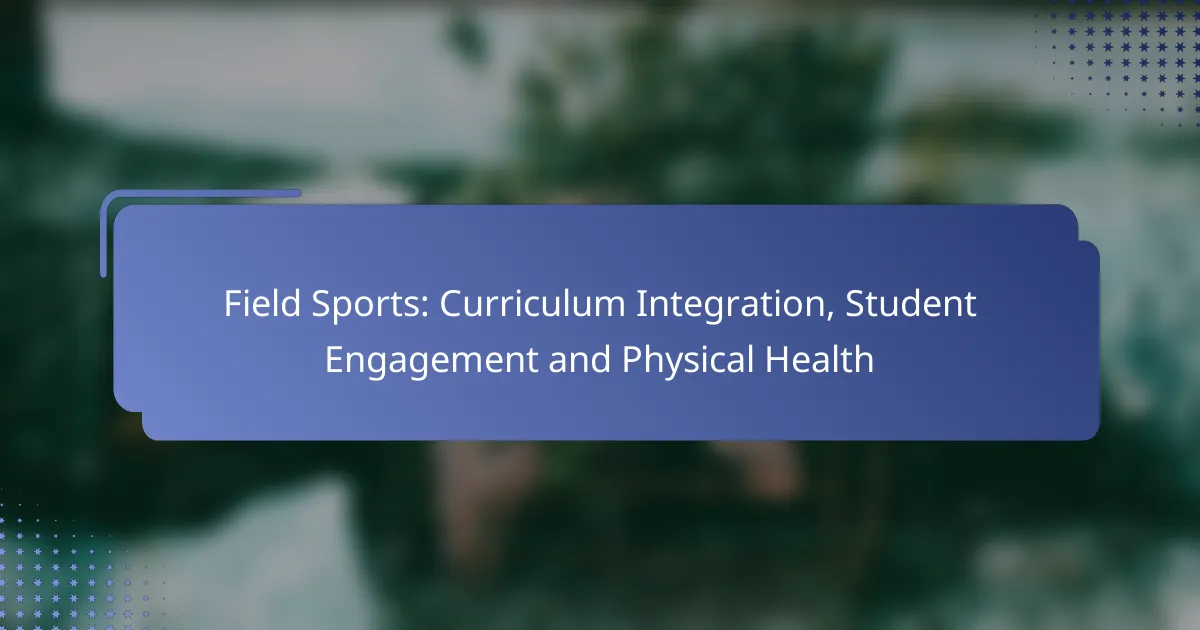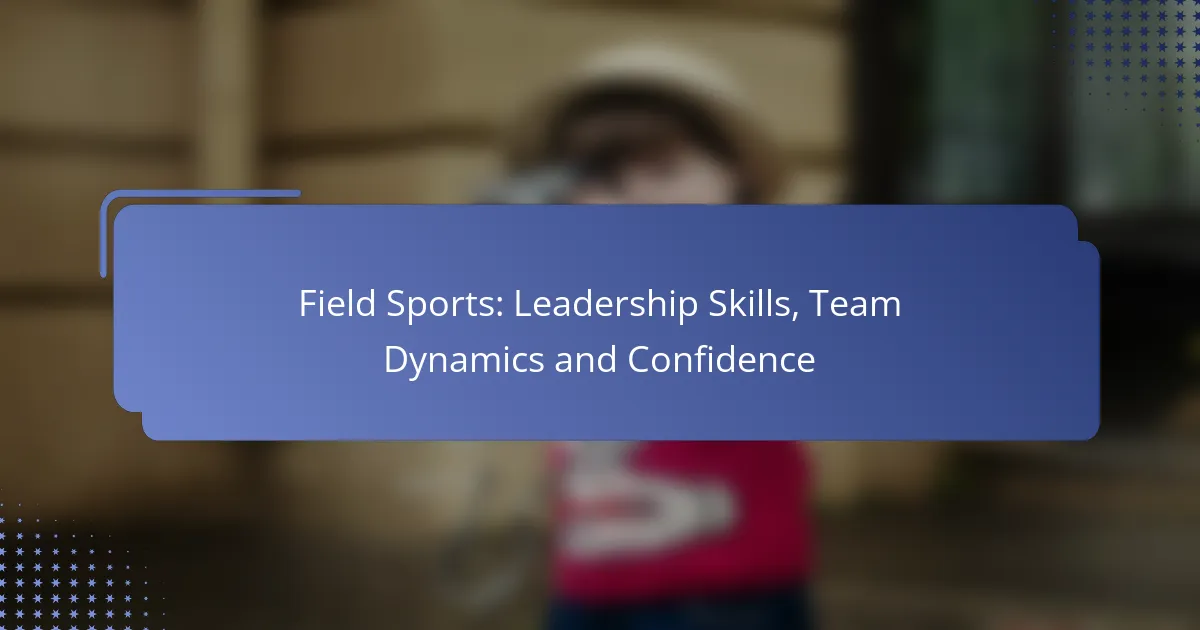Field sports play a vital role in enhancing academic performance by fostering essential skills such as focus, time management, and self-esteem. Participation in these activities not only boosts motivation and concentration in academic settings but also encourages teamwork, which is crucial for developing social skills and effective communication. As students engage in field sports, they build lasting relationships and learn to collaborate towards common goals, positively impacting their overall educational experience.

How do field sports impact academic performance?
Field sports can positively influence academic performance by enhancing essential skills such as focus, time management, and self-esteem. Engaging in these activities often leads to improved concentration in academic settings and a greater sense of motivation to succeed in school.
Improved focus and concentration
Participating in field sports requires players to maintain focus during games and practices, which translates to better concentration in academic tasks. The structured environment of sports encourages individuals to develop attention skills, helping them to stay engaged during lectures and while studying.
For instance, athletes often learn to filter distractions and prioritize tasks, skills that are directly applicable to classroom settings. Regular practice can lead to noticeable improvements in attention span and the ability to absorb information.
Enhanced time management skills
Field sports demand effective time management as athletes balance training, competitions, and academic responsibilities. This experience teaches individuals how to allocate their time efficiently, ensuring they meet deadlines for both schoolwork and sports commitments.
Students involved in sports often create schedules that prioritize their academic workload while allowing time for practice and rest. This skill is crucial for maintaining a healthy balance and can lead to better performance in both areas.
Boosted self-esteem and motivation
Engaging in field sports can significantly boost self-esteem, which in turn enhances motivation in academic pursuits. Success in sports fosters a sense of achievement that can translate to confidence in the classroom.
When students see their hard work paying off in sports, they are more likely to apply the same effort to their studies. This increased motivation can lead to higher grades and a more positive attitude toward learning.

What role does engagement play in field sports?
Engagement in field sports is crucial as it enhances participation, fosters teamwork, and improves overall performance. When athletes are actively involved, they are more likely to develop skills and build lasting relationships within their teams.
Increased participation rates
High levels of engagement lead to increased participation rates in field sports. When athletes feel connected to their teams and the sport, they are more likely to attend practices and competitions consistently.
For example, schools that promote inclusive environments often see participation rates rise significantly, sometimes by 20-30%. This can be achieved through team-building activities and open communication, encouraging more students to join.
Stronger sense of community
Engagement in field sports fosters a stronger sense of community among participants. Athletes develop bonds through shared experiences, which can lead to lifelong friendships and support networks.
Teams that engage in community service or local events often strengthen these connections. For instance, organizing charity matches or local tournaments can enhance team spirit and community involvement, benefiting both the athletes and the local area.
Development of leadership skills
Active engagement in field sports is essential for developing leadership skills among athletes. When individuals participate fully, they often take on roles that require decision-making and responsibility, such as team captain or organizer.
Coaches can facilitate this by assigning leadership tasks during practices or games, allowing athletes to experience leading a team. This hands-on approach helps cultivate essential skills like communication, motivation, and conflict resolution, which are valuable both on and off the field.

How does teamwork in field sports benefit students?
Teamwork in field sports significantly enhances students’ social skills, academic performance, and overall engagement. By working together towards common goals, students learn to collaborate effectively, which translates into better communication and problem-solving abilities in various aspects of their lives.
Collaboration and communication skills
Engaging in field sports requires students to communicate clearly and work together to achieve objectives. This collaboration fosters an environment where they can express ideas, listen actively, and provide constructive feedback. For instance, during a soccer match, players must constantly relay information about positions and strategies, which sharpens their verbal and non-verbal communication skills.
Moreover, effective teamwork in sports can lead to improved academic collaboration. Students who practice teamwork on the field are often more adept at collaborating on group projects in school, enhancing their learning experiences.
Conflict resolution abilities
Field sports often present situations where conflicts arise, whether due to competitive tensions or differing opinions on strategies. Navigating these conflicts teaches students how to address disagreements constructively. For example, a basketball team may face disputes over play calls, prompting players to discuss their perspectives and reach a consensus.
Learning to resolve conflicts in a sports setting equips students with valuable skills for handling disputes in academic and personal contexts. They become more adept at negotiating and finding common ground, which is essential for maintaining healthy relationships.
Building trust among peers
Trust is a fundamental component of effective teamwork in field sports. As students practice together, they learn to rely on one another’s skills and judgment, fostering a sense of camaraderie. This trust not only enhances team performance but also creates a supportive atmosphere where students feel comfortable taking risks and making mistakes.
Building trust through sports can have lasting effects on students’ relationships outside of the field. When students trust their teammates, they are more likely to support each other academically and socially, leading to a more cohesive school community.

What are the prerequisites for successful field sports programs?
Successful field sports programs require a combination of adequate facilities, skilled coaching, and strong administrative support. These elements work together to create an environment conducive to athletic development and team success.
Access to facilities and equipment
Access to proper facilities and equipment is essential for any field sports program. This includes well-maintained playing fields, training areas, and necessary gear such as uniforms, balls, and protective equipment.
Schools should aim to provide facilities that meet safety standards and are suitable for various sports. Regular maintenance and upgrades can enhance the overall experience and performance of the athletes.
Qualified coaching staff
Having qualified coaching staff is crucial for the development of athletes in field sports. Coaches should possess relevant certifications and experience in their specific sport to effectively teach skills and strategies.
Coaching staff should also focus on fostering teamwork and sportsmanship among players. Continuous professional development opportunities for coaches can help them stay updated on best practices and new training techniques.
Supportive school administration
Support from school administration plays a significant role in the success of field sports programs. Administrators should prioritize funding for sports, ensuring that programs have the resources they need to thrive.
Additionally, fostering a culture that values physical education and athletics can encourage student participation. Regular communication between coaches and administration can help align goals and address any challenges that arise.

How can schools enhance field sports participation?
Schools can enhance field sports participation by creating an inclusive environment, providing financial support, and forming partnerships with local organizations. These strategies not only increase engagement but also foster teamwork and academic performance among students.
Implementing inclusive programs
Inclusive programs ensure that all students, regardless of skill level or background, have the opportunity to participate in field sports. Schools should focus on creating teams that accommodate various abilities, offering training sessions tailored to different skill levels.
To implement inclusive programs, schools can organize workshops and clinics that emphasize teamwork and skill development. Engaging students in decision-making about sports activities can also promote a sense of belonging and encourage participation.
Offering scholarships and incentives
Offering scholarships and incentives can significantly boost field sports participation by reducing financial barriers. Schools might consider providing sports scholarships based on merit or need, which can motivate students to join teams and improve their skills.
Incentives such as discounts on equipment or travel expenses for competitions can also encourage participation. Schools should communicate these opportunities clearly to students and parents to maximize awareness and interest.
Creating partnerships with local organizations
Forming partnerships with local organizations can enhance resources and support for field sports programs. Schools can collaborate with community sports clubs, fitness centers, and local businesses to provide facilities, coaching, and sponsorships.
These partnerships can lead to joint events, workshops, and competitions that enrich the sports experience for students. Schools should actively seek out organizations that align with their values and goals to create mutually beneficial relationships.

What are the emerging trends in field sports education?
Emerging trends in field sports education emphasize a holistic approach that integrates academic performance, engagement, and teamwork. These trends focus on enhancing student-athletes’ skills both on and off the field, fostering a balanced development that supports their overall growth.
Increased focus on mental health and well-being
Field sports education is increasingly prioritizing mental health and well-being, recognizing their impact on performance and engagement. Programs are incorporating mental health resources, such as counseling services and workshops, to help athletes manage stress and anxiety.
Coaches and educators are being trained to identify signs of mental distress in athletes, promoting a supportive environment. This shift encourages open discussions about mental health, reducing stigma and fostering resilience among student-athletes.
Integration of technology in training
The integration of technology in field sports education is transforming training methodologies. Tools such as performance tracking apps, wearable devices, and video analysis software are being used to monitor athletes’ progress and enhance their skills.
These technologies provide real-time feedback, allowing coaches to tailor training programs to individual needs. Moreover, data analytics can help in strategizing game plans and improving team performance by analyzing opponents’ strengths and weaknesses.
Emphasis on interdisciplinary learning
Interdisciplinary learning is becoming a key trend in field sports education, linking sports with subjects like science, mathematics, and health. This approach helps athletes understand the physiological and psychological aspects of their sport, enhancing their performance and decision-making skills.
For example, understanding biomechanics can improve an athlete’s technique, while knowledge of nutrition can optimize their diet for better energy levels. Schools are increasingly offering courses that blend sports with academic subjects, promoting a well-rounded education.
Collaboration with community organizations
Collaboration with community organizations is enhancing field sports education by providing additional resources and support. Partnerships with local clubs, health organizations, and educational institutions create opportunities for student-athletes to engage in community service and outreach programs.
These collaborations not only enrich the educational experience but also foster a sense of responsibility and teamwork among athletes. Engaging with the community helps athletes develop leadership skills and build connections that can benefit their future careers.



